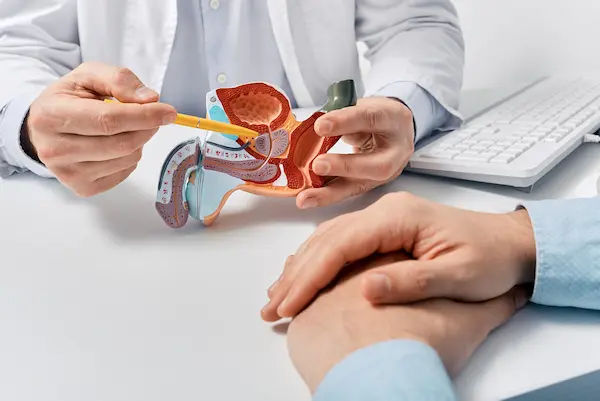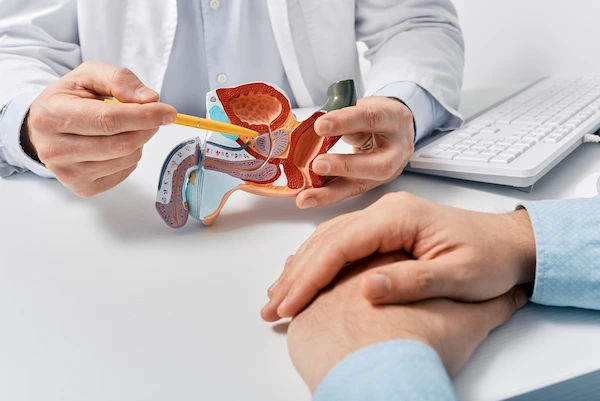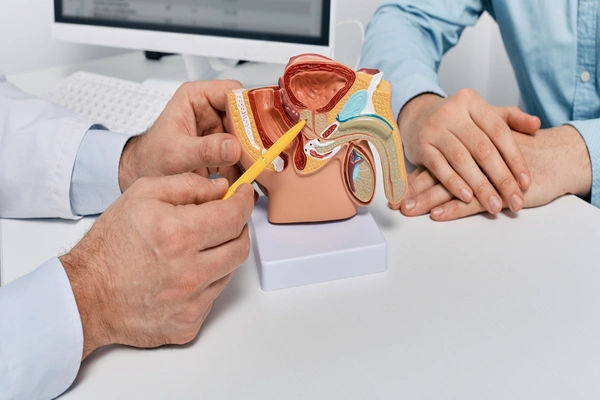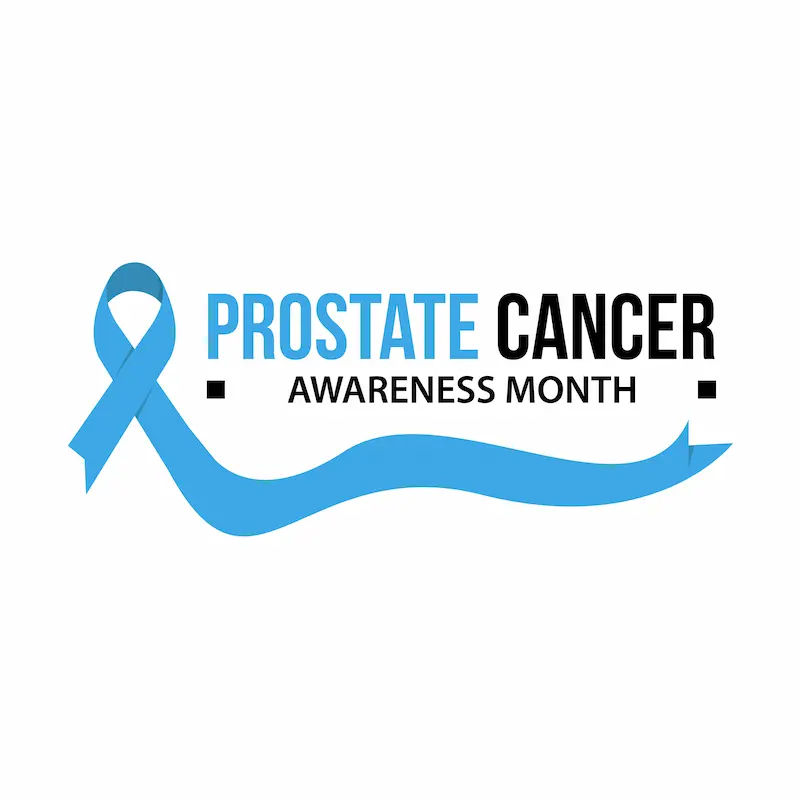What Leads To Signs Of Prostate Cancer And Types
Learn about the risk factors and early signs that can lead to prostate cancer diagnosis. Explore the different types of prostate cancer and their characteristics.

Written by Dr. Shaik Abdul Kalam
Reviewed by Dr. D Bhanu Prakash MBBS, AFIH, Advanced certificate in critical care medicine, Fellowship in critical care medicine
Last updated on 13th Jan, 2026
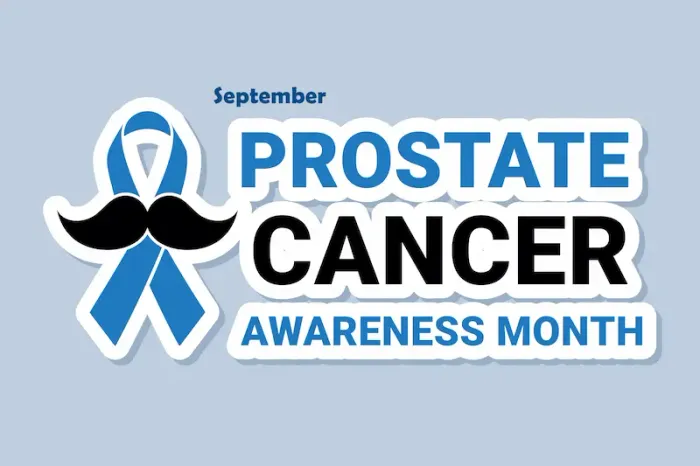
Introduction
Prostate cancer is one of the most common cancers affecting men worldwide, but it's also a disease surrounded by many questions. Understanding what it is, what the warning signs are, and what factors can increase your risk is the first step toward proactive health. Many men live with slow-growing prostate cancer that may never cause serious problems, while other types can be more aggressive. This complexity makes awareness and education crucial. This article will demystify prostate cancer by breaking down the early and advanced symptoms, exploring the key risk factors you should know, and explaining the different types of prostate cancer cells that dictate how the disease behaves. Our goal is to empower you with clear, actionable information so you can have informed conversations with your healthcare provider. If you experience any persistent symptoms, it's always best to consult a doctor. For convenient access to specialists, you can consult a urologist online with Apollo24|7 for an initial evaluation.
What Are the Early Signs of Prostate Cancer?
In its early stages, prostate cancer is often "silent," meaning it may not cause any noticeable symptoms. This is why screening discussions with a doctor are so important, especially for men over 50 or those with risk factors. When symptoms do appear, they are frequently related to the prostate gland's location around the urethra—the tube that carries urine out of the body.
Urinary Symptoms: The Most Common Clues
Because the prostate surrounds the urethra, even a small tumor can press on it and cause changes in urination. It's vital to note that these early warning signs of prostate cancer are very similar to those of a non-cancerous condition called Benign Prostatic Hyperplasia (BPH), which is a common enlargement of the prostate in aging men. Therefore, experiencing these symptoms does not mean you have cancer, but it does mean you should see a doctor. Symptoms include:
1. Frequent urination, especially at night (nocturia).
2. A weak or interrupted urine stream.
3. Difficulty starting or stopping urination.
4. A feeling of not being able to empty the bladder completely.
5. Pain or a burning sensation during urination (dysuria).Consult Top Specialists
Beyond the Urinary Tract: Advanced and Systemic Symptoms
When prostate cancer grows beyond the prostate gland or spreads (metastasizes) to other parts of the body, it can cause more widespread symptoms. These advanced prostate cancer signs indicate a more serious stage of the disease and require immediate medical attention.
• Blood: Blood in the urine (hematuria) or semen.
• Erectile Dysfunction: Difficulty achieving or maintaining an erection.
• Pain: Discomfort or pain in the hips, back, chest, or other areas if the cancer has spread to the bones.
• Numbness or Weakness: In the legs or feet if the cancer presses on the spinal cord.
• Unexplained Weight Loss.
When to See a Doctor: Listening to Your Body
If you experience any of the symptoms above, particularly if they are persistent or worsening, do not ignore them. While they are likely caused by something less serious than cancer, getting a proper diagnosis is essential. If symptoms persist beyond two weeks, consult a doctor online with Apollo24|7 for further evaluation. Early detection is a key factor in successful treatment outcomes for prostate cancer.
What Leads to Prostate Cancer? Uncovering the Risk Factors
The exact cause of prostate cancer remains unknown. However, decades of research have identified specific factors that can increase a man's likelihood of developing the disease. Understanding these risk factors helps in assessing personal risk and making informed decisions about screening.
Unchangeable Risk Factors: Age, Race, and Family History
These are factors you cannot control, but being aware of them is powerful.
• Age: The single biggest risk factor. Prostate cancer is rare in men under 40, but the risk rises significantly after age 50. About 60% of cases are diagnosed in men over 65.
• Race and Ethnicity: For reasons not yet fully understood, Black men have a higher risk of developing prostate cancer and are more than twice as likely to die from the disease compared to White men. They also tend to develop it at a younger age.
• Family History (Genetics): Is prostate cancer hereditary? In many cases, there is a link. Having a father or brother with prostate cancer more than doubles your risk. The risk is even higher if multiple relatives are affected or if they were diagnosed at a young age. Certain inherited gene mutations (like BRCA1 and BRCA2) also increase risk.
Lifestyle and Environmental Factors
These are areas where you may have some influence, though the evidence is still evolving.
• Diet: A diet high in red meat and high-fat dairy products may increase risk, while a diet rich in fruits and vegetables may have a protective effect.
• Obesity: Obese men may have a higher risk of developing a more aggressive form of prostate cancer, and it can be more challenging to treat.
• Smoking: Some studies have linked smoking to a slightly increased risk of fatal prostate cancer.
Not All Prostate Cancers Are the Same: A Guide to the Types
This is a critical distinction that many overviews miss. The term "prostate cancer" is an umbrella term for several different types of prostate cancer, and the specific type influences how the cancer behaves, how it's treated, and the prognosis.
Adenocarcinoma: The Vast Majority of Cases
More than 95% of all prostate cancers are adenocarcinomas. This means the cancer starts in the gland cells that make the prostate fluid that is added to semen. There are two main subtypes:
Acinar Adenocarcinoma
This is the most common subtype, accounting for nearly all cases. It develops in the gland cells that line the prostate.
Ductal Adenocarcinoma
This is a rarer subtype that starts in the cells lining the tubes (ducts) of the prostate. It tends to be more aggressive than acinar adenocarcinoma and may spread more quickly.
Rare and Aggressive Types of Prostate Cancer
These types are uncommon but important to recognize because they are often more serious and require different treatment approaches. They include:
• Transitional Cell (or Urothelial) Carcinoma: This cancer starts in the urethra (the tube that carries urine) and can spread into the prostate. It is treated more like bladder cancer.
• Small Cell Carcinoma: A very aggressive neuroendocrine cancer that grows and spreads rapidly.
• Squamous Cell Carcinoma: Another rare and aggressive type.
• Sarcomas: These cancers start in the soft tissues of the prostate and are extremely rare.
Understanding Prostate Cancer Grading (Gleason Score)
When a biopsy is done, the tissue is examined under a microscope and given a "grade." The grade describes how abnormal the cancer cells look compared to healthy prostate cells. The most common system is the Gleason Score.
• Low Grade (Gleason 6 or less): The cancer cells look similar to healthy cells and are likely to grow slowly. This is often called low-grade or Grade Group 1 cancer.
• Intermediate Grade (Gleason 7): The cells are more abnormal. This cancer may grow at a moderate rate.
• High Grade (Gleason 8-10): The cells look very abnormal and are considered aggressive, with a higher likelihood of growing and spreading quickly.
Understanding your Gleason score prognosis is a fundamental part of deciding on a treatment plan with your oncologist.
Conclusion
Understanding the signs, causes, and particularly the different types of prostate cancer is fundamental to navigating this common health concern. Knowledge dispels fear and enables proactive management. Remember, many prostate cancers are slow-growing and highly treatable, especially when detected early. Paying attention to your body, understanding your personal risk factors, and maintaining open communication with your doctor are your best defenses. If you have any concerns based on your symptoms or family history, don't hesitate to seek professional advice. Diagnostic tests, including a PSA blood test, are straightforward. Apollo24|7 offers convenient home collection for tests like PSA, making the first step towards peace of mind easier than ever. Your health is your most valuable asset—take charge of it today.Consult Top Specialists
Consult Top Specialists

Dr. Vasanthasree Nair
General Practitioner
15 Years • MBBS
Angamaly
Apollo 24|7 Clinic - Kerala, Angamaly
(500+ Patients)

Dr. Siri Nallapu
General Practitioner
5 Years • MBBS
Hyderabad
Apollo 24|7 Clinic, Hyderabad

Dr. Rajib Ghose
General Physician/ Internal Medicine Specialist
25 Years • MBBS
East Midnapore
VIVEKANANDA SEBA SADAN, East Midnapore

Dr. Chethan T L
General Physician/ Internal Medicine Specialist
5 Years • MBBS, MD, DNB (General Medicine)
Bengaluru
Apollo Medical Center, Marathahalli, Bengaluru

Dr D M Karthik
General Practitioner
4 Years • MBBS, Fellowship in Diabetes Mellitus, Advance certificate in Diabetes Mellitus, Derma Nutrition Certification
Visakhapatnam
Apollo 24|7 Clinic - Andhra Pradesh, Visakhapatnam
Consult Top Specialists

Dr. Vasanthasree Nair
General Practitioner
15 Years • MBBS
Angamaly
Apollo 24|7 Clinic - Kerala, Angamaly
(500+ Patients)

Dr. Siri Nallapu
General Practitioner
5 Years • MBBS
Hyderabad
Apollo 24|7 Clinic, Hyderabad

Dr. Rajib Ghose
General Physician/ Internal Medicine Specialist
25 Years • MBBS
East Midnapore
VIVEKANANDA SEBA SADAN, East Midnapore

Dr. Chethan T L
General Physician/ Internal Medicine Specialist
5 Years • MBBS, MD, DNB (General Medicine)
Bengaluru
Apollo Medical Center, Marathahalli, Bengaluru

Dr D M Karthik
General Practitioner
4 Years • MBBS, Fellowship in Diabetes Mellitus, Advance certificate in Diabetes Mellitus, Derma Nutrition Certification
Visakhapatnam
Apollo 24|7 Clinic - Andhra Pradesh, Visakhapatnam
More articles from Prostate cancer
Frequently Asked Questions
1. Can you have prostate cancer with a normal PSA level?
Yes, it is possible. This is called a false-negative. Some men with prostate cancer have PSA levels within the 'normal' range. Conversely, a high PSA can be caused by non-cancerous conditions like BPH or prostatitis. The PSA test is a tool, not a definitive diagnosis.
2. What is the life expectancy for a man with prostate cancer?
Life expectancy varies tremendously and depends on the cancer's stage and grade at diagnosis, the man's age, and overall health. Many men with low-risk, localized prostate cancer have a normal life expectancy. Even with advanced disease, new treatments have significantly extended survival.
3. What are the treatment options for early-stage prostate cancer?
Options can include active surveillance (monitoring slow-growing cancers), surgery (prostatectomy), radiation therapy, and sometimes focal therapies that target only the tumor. The choice depends on the cancer's specifics and the patient's preferences.
4. How can I reduce my risk of prostate cancer?
While you can't eliminate risk, you can adopt a healthy lifestyle: maintain a healthy weight, eat a balanced diet rich in fruits and vegetables, exercise regularly, and avoid smoking. Discuss screening with your doctor if you have risk factors.
5. What is the difference between BPH and prostate cancer?
BPH (Benign Prostatic Hyperplasia) is a non-cancerous enlargement of the prostate that causes similar urinary symptoms. Prostate cancer involves the uncontrolled growth of malignant cells. While BPH is not cancer and does not turn into cancer, a man can have both conditions simultaneously.
